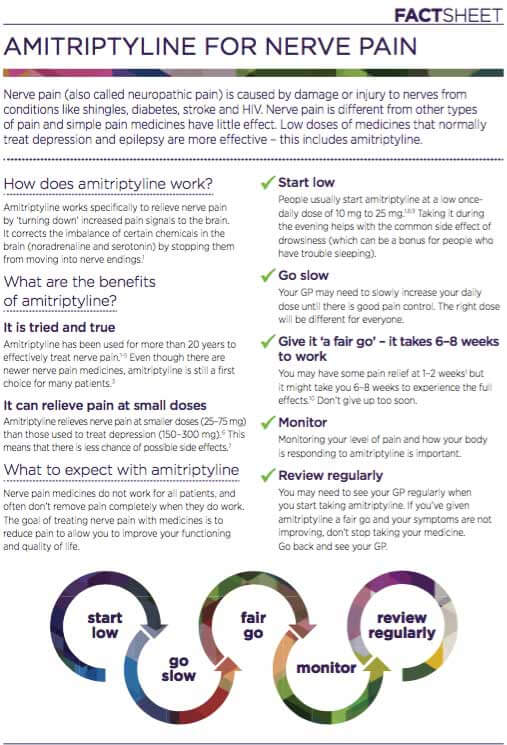Like all medicines, amitriptyline can cause side effects, although not everyone gets them. Often side effects improve as your body gets used to the new medicine.
Suicidal behaviour
The use of antidepressants has been linked with self-harm or suicidal thoughts and behaviour. Children, teenagers, young adults and people with a history of suicidal behaviour are most at risk. This is most likely during the first few weeks of starting treatment or if the dose is changed. It is important to look out for signs of suicidal behaviour such as suicidal thoughts, self-harm, worsening of low mood, agitation or aggression.
If you notice any of these signs, contact your doctor immediately. If you need urgent help or are concerned, phone:
- Lifeline 0800 543 354 (available 24/7), or
- Healthline 0800 611 116, who can give you the phone number for your local mental health crisis line.
Other side effects
| Side effects |
What should I do? |
- Feeling sleepy, drowsy, or tired
|
- These are quite common when you first start taking amitriptyline and usually goes away with time
- It may be best to take amitriptyline at bedtime
- Be careful when driving or using tools until you know how this medicine affects you
- These effects put you at risk of falls, and injuries especially if you are elderly. Tell your doctor if you are concerned
- Do not drink alcohol
|
- Feeling dizzy, faint or lightheaded
|
- Get up slowly when rising from a sitting or lying position
- These effects put you at risk of falls, and injuries especially if you are elderly. Tell your doctor if you are concerned
|
- Dry mouth
- Constipation
- Sore mouth
- Anxiety or restlessness
|
|
- Suicidal thoughts, thoughts of harming yourself, or worsening depression
|
- Tell your doctor immediately or ring HealthLine 0800 611 116
|
- Signs of an allergic reaction such as skin rash
|
- Tell your doctor immediately or ring HealthLine 0800 611 116
|
- Signs of serotonin syndrome such as feeling agitated and restless, heavy sweating, shivering, fast heart rate or irregular heartbeat, headache, diarrhoea and rigid or twitching muscles
|
- You are at increased risk of serotonin syndrome if you recently started
taking amitriptyline or recently increased the dose
- Tell your doctor immediately or ring HealthLine 0800 611 116
|
| Did you know that you can report a side effect to a medicine to CARM (Centre for Adverse Reactions Monitoring)? Report a side effect to a product(external link) |








